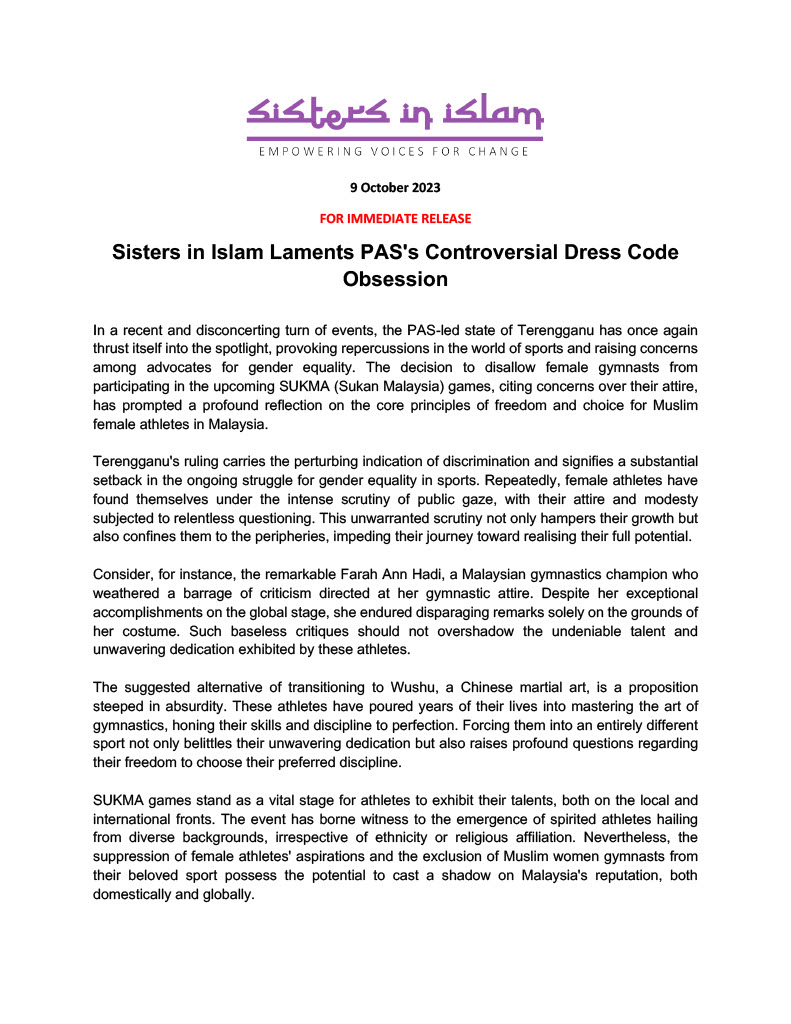In a recent and disconcerting turn of events, the PAS-led state of Terengganu has once again thrust itself into the spotlight, provoking repercussions in the world of sports and raising concerns among advocates for gender equality. The decision to disallow female gymnasts from participating in the upcoming SUKMA (Sukan Malaysia) games, citing concerns over their attire, has prompted a profound reflection on the core principles of freedom and choice for Muslim female athletes in Malaysia.
Terengganu’s ruling carries the perturbing indication of discrimination and signifies a substantial setback in the ongoing struggle for gender equality in sports. Repeatedly, female athletes have found themselves under the intense scrutiny of public gaze, with their attire and modesty subjected to relentless questioning. This unwarranted scrutiny not only hampers their growth but also confines them to the peripheries, impeding their journey toward realising their full potential.
Consider, for instance, the remarkable Farah Ann Hadi, a Malaysian gymnastics champion who weathered a barrage of criticism directed at her gymnastic attire. Despite her exceptional accomplishments on the global stage, she endured disparaging remarks solely on the grounds of her costume. Such baseless critiques should not overshadow the undeniable talent and unwavering dedication exhibited by these athletes.
The suggested alternative of transitioning to Wushu, a Chinese martial art, is a proposition steeped in absurdity. These athletes have poured years of their lives into mastering the art of gymnastics, honing their skills and discipline to perfection. Forcing them into an entirely different sport not only belittles their unwavering dedication but also raises profound questions regarding their freedom to choose their preferred discipline.
SUKMA games stand as a vital stage for athletes to exhibit their talents, both on the local and international fronts. The event has borne witness to the emergence of spirited athletes hailing from diverse backgrounds, irrespective of ethnicity or religious affiliation. Nevertheless, the suppression of female athletes’ aspirations and the exclusion of Muslim women gymnasts from their beloved sport possess the potential to cast a shadow on Malaysia’s reputation, both domestically and globally.
The root of this issue can be traced back to the Terengganu state government’s unwavering fixation on women’s attire, culminating in an unjust restriction on female participation in sports. The cherished values of freedom of choice, equality, and inclusivity appear to have been sacrificed at the altar of dogma. It is incumbent upon us to revisit this decision, for sports should empower athletes to realise their full potential, devoid of undue constraints.
This ruling by the Terengganu government constitutes a grave infringement on women’s rights to partake in recreational activities, including sports, a right enshrined in CEDAW (the international bill of rights for women). This outright disregard for equality raises legitimate concerns and epitomises a troubling trend where the voices and rights of women are systematically stifled under the overbearing influence of PAS.
Moreover, we are concerned about the potential wider implications of this decision on other sports, especially those that involve female athletes wearing specific types of outfits. These implications may include:
- Reduced participation and representation of female athletes from Terengganu and other PAS-led states in national and international competitions, which could affect their chances of winning medals and recognition.
- Loss of talent and potential among female athletes who are forced to quit or switch to other sports that are deemed more acceptable by the state government, which could affect their passion and performance.
- Increased discrimination and harassment of female athletes who choose to continue with their sports, which could affect their mental and physical well-being.
- Damage to Malaysia’s reputation as a diverse and progressive nation that supports and celebrates sports excellence and inclusivity.
The question then arises: should women not possess the autonomy to make choices regarding their attire and actions? Must these aspects of their lives be subjected to PAS’s rigid interpretations of right and wrong?
As if coming out with an absurd ruling on sports for female gymnasts is not enough; the PAS-led Terengganu state has also taken steps to further restrict women’s choices in another aspect of their lives. In recent news, the Terengganu state has announced their intention to strengthen and enforce a “shariah-compliant” dress code for Muslim tourists in key tourists attraction spots like Pulau Redang and Pulau Perhentian, where this code will be enforced at all entrance into the state, leaving detrimental effects towards Malaysia’s economy.
The erosion of women’s constitutional rights, coupled with their gradual retreat from public spaces, serves as a distressing indicator of Malaysia’s progression toward a modern and inclusive nation.
The future of our nation hangs in the balance, and it is of paramount importance that we resist this suffocating trend. PAS, alongside other Islamic political entities in Malaysia, seems to grapple with issues related to women. They are systematically chipping away at women’s rights, relegating them to the shadows and quelling their aspirations. This can be seen in the lack of participation of women at state level decisions.
In a country undergoing a process of Islamisation driven by political Islam, it is a source of deep disappointment that PAS and religious figures harbour doubts regarding the ability of Muslim women in Malaysia to make informed choices about their attire and actions. It is high time we acknowledge that women possess the wisdom and discernment to live as devout individuals without the need for excessive oversight. Only through such recognition can we genuinely advance as a nation that upholds the rights and amplifies the voices of all its citizens, irrespective of gender.
